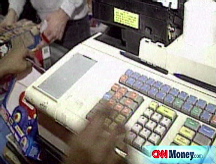Breakfast price break on the table
'Unsustainable' prices for cereal and other foods could moderate soon, experts say, but get ready to pay more for meat.
NEW YORK (CNNMoney.com) -- Beth Bastian, a Web site project designer and mother of three in Los Angeles, is facing down soaring food costs and finding creative ways to put breakfast on the table.
Bastian said she headed to her local Vons grocery chain, which temporarily doubled the buying power of all coupons. Armed with a fistful of $1 coupons, she said she was able to get 45 boxes of $2 cereal for free.
"My opinion is that if you really look out for good deals, you can combat this, unlike the price of gas," said Bastian. "I was able to get all my cereal for free."
Bastian and other consumers could soon see some inflation relief including a drop in sky-high prices for some of the more notoriously inflated items, such as cereal and other grain products.
The U.S. Department of Agriculture expects food prices to increase by 4.5% to 5.5% this year, said spokesman Keith Williams, which is a decrease from the current rate. The price of food and beverages increased 6.7% in the first six months of 2008, according to the Bureau of Labor Statistics' Consumer Price Index.
The price of cereals and bakery products jumped 15.9% during the first six months of the year, according to the CPI. The price of flour and prepared flour mix has soared 33.8% during the first half, while the price of rice, pasta and cornmeal has surged 40.6%.
Ethanol production has been blamed for food-price inflation, but Williams said high oil prices are the biggest culprit, because of the costs of shipping. But the cost of crude has declined dramatically in recent weeks, plummeting more than $30 a barrel after hitting a peak of $147.27 on July 11.
John Norris, a food price analyst and director of wealth management for Oakworth Capital Bank in Birmingham, Ala., said grain and cereal prices are "unsustainable" at their current levels, and he expects them to "moderate or fall by the end of the year."
"If we haven't reached the top already, we'll reach it soon," he said. "Once commodities have stabilized and started to fall, food prices will start to fall as well."
"Milk is easing a little, but milk prices have been going up so high, for the average consumer they're still expensive," she said.
Scott Mushkin, a grocery retail analyst for Jefferies & Co., believes dairy prices will continue to be "flat or slightly down" in the near future. He added that egg inflation, which has already slowed down to 6.1% in the first half of 2008 from 43.6% in the second half of 2007, will "flatten out."
"The consumers have not seen the impact of what has happened back at the farm," he said. "The pricing of meat has not reflected inflation in grain prices."
On Thursday, the government will release CPI figures for July after reporting food and beverage prices edged up 0.7% in June. Every month this year, food prices have increased by a fraction of a percentage point. "I don't foresee any radical changes," for July said Mogelonsky.
While food prices are high, she noted, the nation is not going hungry. "We're still a well-fed country," she said.
Correction: An earlier version of this story misspelled the name of the Vons grocery chain. ![]()



